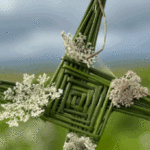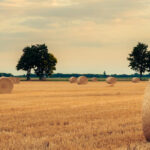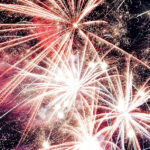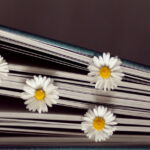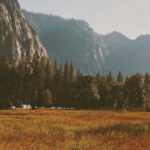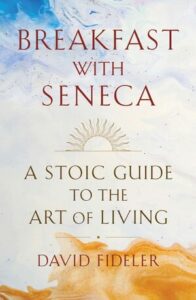
![]()
Breakfast with Seneca: A Stoic Guide to the Art of Living
David Fideler
Non-fiction, paperback
“Virtue, or excellence of one’s inner character, is the only true good.”
More than any other ancient philosophy, Stoicism has stood the test of time because of its universal relevance. No matter where/when we live or the specifics of our circumstances, we will always need ways to cope with worry, handle grief, and find ways to be a good person (whatever that means to us). Breakfast with Seneca is a detailed but approachable study of the tenets of Stoicism that shows readers how to implement these tried and true best practices in modern life.
I can’t remember when or why I added this to my TBR, but I’m glad I finally picked it up. Author David Fideler does a great job of explaining both the larger concepts and finer nuances of Stoicism; I particularly enjoyed the chapters on valuing your time and gratitude.
Grab this if you’re looking for a terrific introduction to — or refresher/deep dive on! — Stoicism.
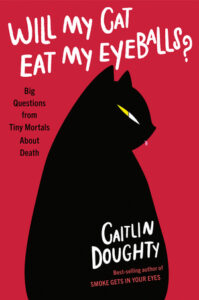
![]()
Will My Cat Eat My Eyeballs? Big Questions from Tiny Mortals About Death
Caitlin Doughty
Non-fiction, audiobook
“We can’t make death fun, but we can make learning about it fun. Death is science and history, art and literature. It bridges every culture and unites the whole of humanity!”
If you’ve spent any time around kids, you know they ask wild questions — turns out, this trend extends to the topic of death. Why don’t bugs eat people’s bones? If I died making a stupid face, would it be stuck like that forever? Can I preserve my dead body in amber like a prehistoric insect? Mortician Caitlin Doughty answers these and other genuinely interesting questions with her characteristic sense of humor and expertise.
I’ve been a fan of Doughty’s stances and sense of joyful macabreness for years, and it was so fun to hear the kinds of questions she gets “out of the mouths of babes” who have yet to develop the fears and filters that make death taboo. I find the human body and cultural practices/beliefs around death and dying fascinating, and I consider this Q&A a great addition to my “shelf of books that make normies super uncomfortable.”
A great read for those who love “weird” science, cultural studies, and want answers to questions they’re too afraid to ask.
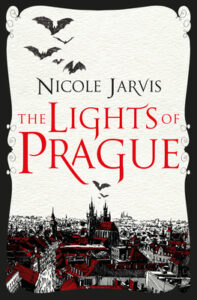
![]()
The Lights of Prague
Nicole Jarvis
Fiction, paperback, library
“Prague did not know Domek, did not need him, but his life was overlaid on the ancient streets in watercolor, the patterns sheer and impermanent.”
Domek Myska is a lamplighter…and hunter. The ancient city is crawling with pijavica, monsters who crave blood and will kill to get it. After a midnight clash on the Charles Bridge, Domek discovers a powerful item that puts him in greater danger than he could have imagined. Someone is helping the pijavica find a way to unleash their powers on the daylight world.
I spent a month in Prague in college, and am always happy to revisit it through a book. The fact that this story includes vampires is just a fun perk. I enjoyed the worldbuilding and descriptions of the city I love, but I didn’t find the story itself super engaging. It wasn’t bad, but it didn’t have that special spark that kept me up past my bedtime for “just one more chapter!”.
Give this a try if you like supernatural historical fiction that doesn’t get too deep.
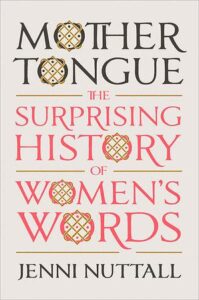
![]()
Mother Tongue: The Surprising History of Women’s Words
Jenni Nuttall
Non-fiction, hardback, library book, DNF
“Like vintage tools laid out for sale at a flea market, we can pick up these older words, puzzle out their purposes, compare them with today’s language and see if we have any use for them, decorative or practical.”
The history of the English language is a winding path, especially when it comes to describing women’s minds, bodies, and activities. But where are these words from — and why do the only options seem to be clinical or (treated as) obscene? Are the words we use today good simply because they’re newer, or could we return to older, better ways of describing womens’ shared experiences?
Seeing this book described as Nuttall’s “first book for general readers” should have clued me in; by page 98 I was up to my eyeballs in complex etymology that could not hold my interest. The book was structured sensibly and I appreciated the themes, but I just couldn’t do it for another 170 pages.
Read this if you really — I mean really — enjoy the history of language.
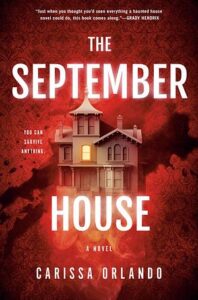
![]()
The September House
Carissa Orlando
Fiction, hardback, library book
“It wasn’t horrible every single day—so few things ever are—and when it wasn’t horrible, it was almost lovely.”
Empty nesters Margaret and Hal can’t believe their luck when they find the Victorian home of their dreams for sale at a surprisingly reasonable price. Then the first September rolls around, and the walls begin to bleed. Three Septembers, multiple ghostly squatters, and one terrifying basement encounter later, Hal wants out. But Margaret won’t budge. It’s true the house isn’t perfect, but it’s hers — and she can survive anything.
I’m glad I picked this up on a weekend, because I don’t think I could have put it down to go to work. The transition from introduction to chapter one set me spinning, and it felt like I was holding my breath until the very last page. The story is tight and tense and full of parallels like hauntings/abuse and ghostly rage/motherly rage. A major contender for my favorite read of the year.
This book may be perfect for you if you like wild, page-turning terror and are okay with potentially never sleeping again.
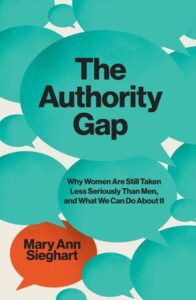
![]()
The Authority Gap: Why Women Are Still Taken Less Seriously Than Men, and What We Can Do About It
Mary Ann Sieghart
Non-fiction, hardback, library book, DNF
“…we still expect women to be less expert than me. Most of us — men and women — are still less willing to be influenced by women’s views. And we still resist the idea of women having authority over us.”
Ask any woman you know if they’ve ever been belittled or ignored by a man in the workplace and I guarantee she’ll have some stories for you. While most men are not intentionally horrible to women, we all have so many unconscious biases that it’s nearly impossible to work against them all. But the only way we can close that “authority gap” is to recognize the problem and fight together against it.
I figured this book would be right up my alley, but I actually think that’s what ended up being the problem. Not only do I have my own ridiculous experiences as a woman in the workplace, I’ve also read a lot about feminism, bias, and the other topics Sieghart covers. 14 of the 15 chapters (278 pages!) focused on describing the problem instead of proposing solutions, and none of it was new.
This book was clearly not written for me, but it could be a great choice for those who don’t already believe in the authority gap.
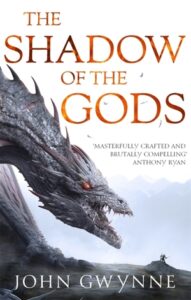
![]()
The Shadow of the Gods
John Gwynne
Fiction, paperback, book club
“This is a world of blood. Of tooth and claw and sharp iron. Of short lives and painful deaths.”
The war between the gods is long over, but precious few in the land of Vigrið know peace. Determined jarls squabble over territories, bloodthirsty mercenaries roam in search of gold and glory, and inhuman Tainted skitter through the shadows. Three fighters, each on their own quest, must take what is theirs — or die trying.
Our book club’s June selection seems to have prompted a collective “meh” from the group. We liked the setting and worldbuilding, but didn’t find the characters compelling (or even that easy to tell apart) or the story itself propulsive. The boat rowing/skull cracking and plot movement ratios felt way off, and no one seems interested in wading through two more books to get to the conclusion.
Pick up a copy if you like Norse mythology, classic fantasy, and are okay with a lot of gore.
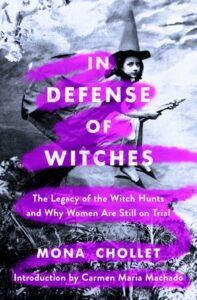
![]()
In Defense of Witches: The Legacy of the Witch Hunts and Why Women Are Still on Trial
Mona Chollet
Non-fiction, hardback, library book
“Who is this Devil who, from the fourteenth century onward, in the eyes of powerful European men, began to loom behind the figure of every female healer, every sorceress, every woman who was slightly too forward or too much of a stirrer, to the point that they became a mortal threat to society? What if this Devil were in fact independence?”
The witch hunts that swept Europe in centuries past may be long over, but the specter of the witch herself lives on in literature, pop culture, and aesthetic Instagram posts. Who is this woman — independent, childless, visibly aging — and how do the persecutions of yesteryear contribute to the harassment and oppression she experiences today?
I’ve read a fair amount of feminist literature, so there’s not much that surprises me — but the angle Chollet focused on for this book was unique and fascinating. I hadn’t considered how the witch hunts of previous centuries ended entire family lines, decimated the knowledge handed down through generations, and laid the foundation for the painful pressures women face today. This one hooked me so hard that I read through large portions of it twice.
Try this if you’re looking for a unique perspective on history and how it impacts (and hurts) women today.
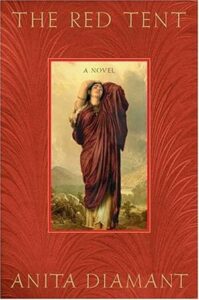
![]()
The Red Tent
Anita Diamant
Fiction, hardback, library book
“It is terrible how much has been forgotten, which is why, I suppose, remembering seems a holy thing.”
The Biblical story of Dinah, like many others of her gender, is told from the male perspective and focuses on how the men respond — we never hear from Dinah herself. Diamant’s novel is an attempt to give Dinah and the women who raised her their own stories.
This book has been on my TBR for years, and I’m so glad I picked it up this month. So much of women’s history has been lost, the victim of patriarchal religions that scorn our knowledge and consider our bodies weak or revolting. The story Diamant weaves for Dinah shoves those notions aside, portraying men as ruled by their egos and fear of what they don’t understand. The tale is powerful, heartbreaking, and uplifting in equal measure.
I believe everyone should read this book.
Photo by Khachik Simonian on Unsplash

